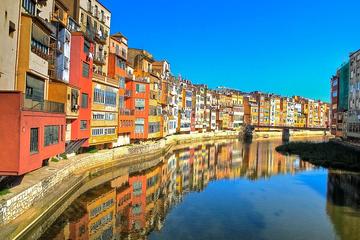
Girona - also known as Gerona - has long stood at the crossroads of important trade routes, at the confluence of four rivers (the Ter, Onyar, Galligants and Güell), and between the Iberian Peninsula and France. Its mercantile wealth over the millennia is expressed in outstanding buildings, from the colorful art nouveau waterfront facades to the millennia-old stone buildings of the medieval Old Quarter.
Perhaps the most impressive edifice is the massive 11th-century cathedral; it stands atop the ruins of a mosque and even older church. This is not the only sacred site, however; in the Call, or old Jewish quarter, you'll find what were once among Europe's most important Kabbalah Schools and Yeshivas, the latter only recently rediscovered.
A handful of museums offer even more cultural enrichment, though some may prefer to experience Catalonia at the table. This region of fine cheeses and olives, so close to the sea, is famed for its fine gastronomy.
The city of Girona is rapidly becoming a regional transport hub, largely due to Ryanair's massive expansion of services at convenient Girona-Costa Brava Airport (GRO), offering year-round direct flights to international destinations
Girona's train station is also just outside town (taxis are plentiful), and links the city to Barcelona, Figueres, and the Costa Brava; a Paris train is due to be inaugurated soon.
Girona's old quarter, including El Call (the Jewish Quarter) and La Rambla, are easily explored on foot. Taxis are available for visiting the more modern outlying neighborhoods.